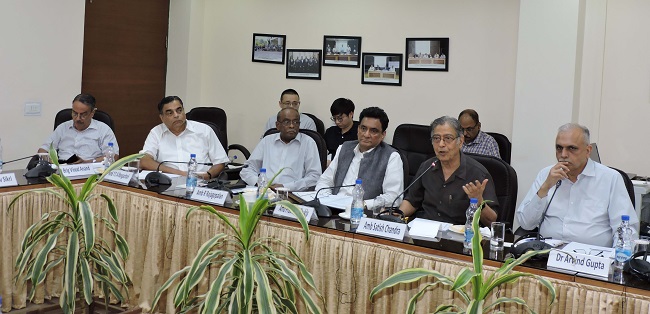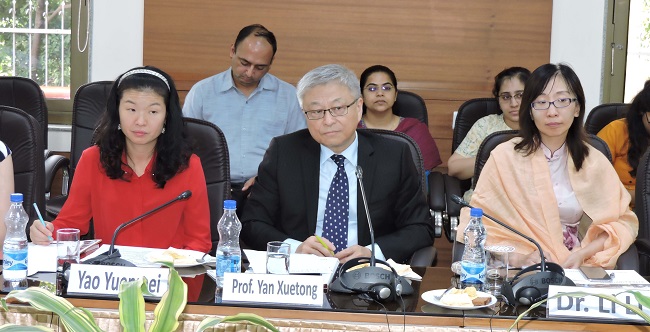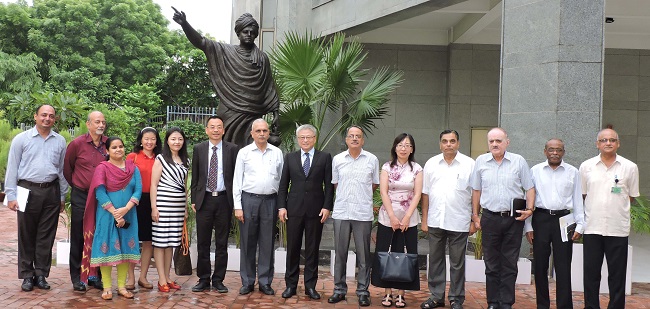

The Vivekananda International Foundation (VIF) hosted a delegation from Tsinghua University, Beijing, on 29 August 2018. The delegation was led by Prof. Yan, Xuetong, Dean of the Institute of International Relations, and comprised of Prof. Sun Xuefeng, Dr Li Li and Liu Zhuang. Dr Arvind Gupta, Director VIF, delivered the opening remarks and presided over the session. The interaction was attended by Amb. Satish Chandra, Lt Gen Ravi Sawhney, Amb. Prabhat P. Shukla, Amb. R. Rajagopalan, Lt Gen Gautam Banerjee, Amb. TCA Rangachari, Lt. Gen S L Narasimhan and many other think tank members.
The Chinese participants made a presentation on the evolving global situation. They argued that the US-China trade conflict was becoming severe and it was likely to be protracted. They highlighted that China was not only the target country; the tariffs initiated by Donald Trump might gradually affect other countries as well. Under Donald Trump, the US has changed itself from an advocate of free trade to a guardian of protectionism. In the process, it was disregarding the mandate of the World Trade Organisation (WTO) for developing countries. The US was trying to change the international order without any blueprint. They thus proposed that, at this juncture, both India and China should look for creative ways of cooperation. Both the countries should step up economic cooperation in South Asia especially keeping in view the challenge of poverty in the region.

The Chinese participants observed that India and China could together play a role in shaping the international order. They reiterated that the border issue was unlikely to be solved soon. Hence both the countries should think about broader issues in the bilateral relations. They also proposed for cooperation in Artificial Intelligence (AI), that being one of the areas that would affect both the countries. They further advocated greater economic cooperation and people-to-people ties between the two countries. Governments from both the sides should facilitate in creating an environment for cooperation and they should take an objective view of the relationship.
The Chinese participant assessed the concept of Indo-Pacific. They said that in China there was a discussion about the origin and the driving force behind the concept; a certain section believes that it is the US while the others believe it is Japan. They argued that the future of Indo-Pacific as a concept appeared to be uncertain. They further said that both India and China may face this uncertainty and coping with this situation will be a big challenge in the future.

The participants from India proposed that both India and China should work together to make Afghanistan stable country. Any project based on collaboration can only happen if the region becomes stable. If there is a resurgence of Taliban in Afghanistan it will affect China as well. In fact, the Xinjiang province of China will experience the repercussions. The Chinese delegates responded in generalities, and expressed the caution that external solution was unworkable whereas Afghanistan was a graveyard of superpowers.
Participants from India highlighted that the leitmotif of maritime interactions has been premised on the management of traditional and non-traditional securities. Ironically, inter-state cooperation on challenges to ocean health has invariably been given a short shrift. Ocean acidification, eutrophication, overfishing and plastic pollution have assumed huge proportions, but have attracted the least collaboration among the states. As a result, today ocean health is under threat and so is the Man’s food security. The positive aspect of these challenges is that they offer a potential for a new approach to cooperation between India and China, and provide a regional framework going beyond bilateral issues.

India and China being the two emerging powers in Asia with substantial capacities and influence in the Indian Ocean and the Asia Pacific, may yet not have the wherewithal to restore ocean health all by themselves. Nevertheless, bilateral collaboration between India and China has immense potential and can progress in a graduated manner in order to build consensus. The proposed mechanism is as follows:-
These steps would also further Prime Minister Modi’s vision of building an inclusive Indo-Pacific.
Links:
[1] https://www.vifindia.org/event/report/2018/september/10/interaction-with-delegation-from-the-tsinghua-university
[2] http://www.facebook.com/sharer.php?title=Interaction with Delegation from the Tsinghua University, Beijing&desc=&images=https://www.vifindia.org/sites/default/files/interaction-with-delegation-from-the-tsinghua-university.jpg&u=https://www.vifindia.org/event/report/2018/september/10/interaction-with-delegation-from-the-tsinghua-university
[3] http://twitter.com/share?text=Interaction with Delegation from the Tsinghua University, Beijing&url=https://www.vifindia.org/event/report/2018/september/10/interaction-with-delegation-from-the-tsinghua-university&via=Azure Power
[4] whatsapp://send?text=https://www.vifindia.org/event/report/2018/september/10/interaction-with-delegation-from-the-tsinghua-university